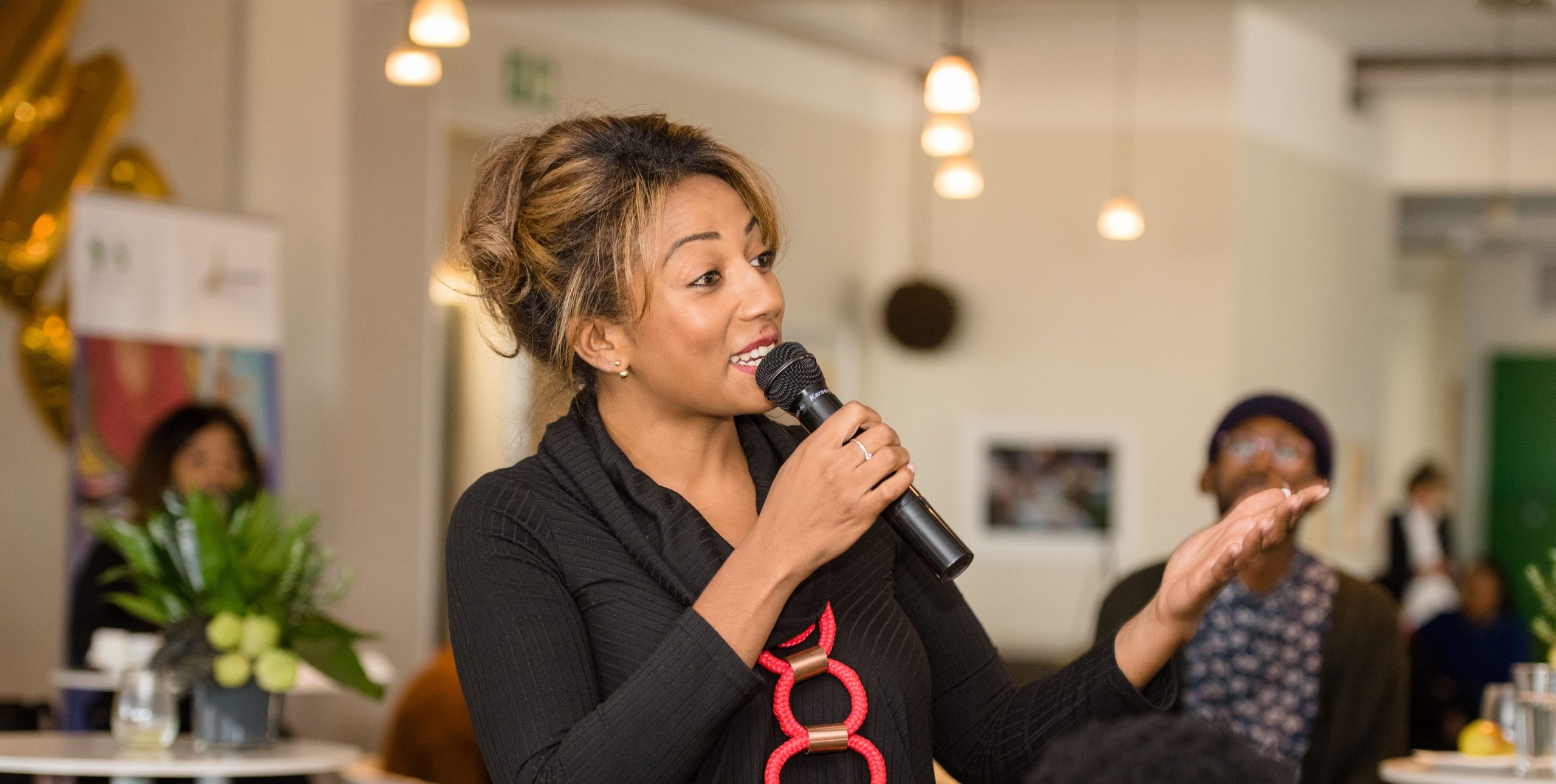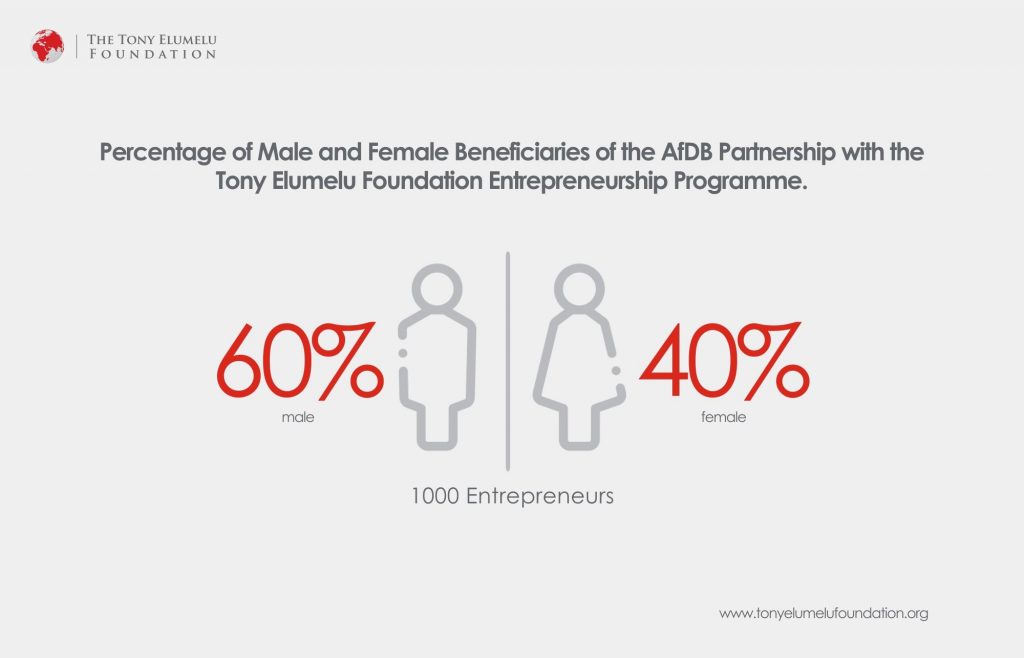
Gender Diversity, African Entrepreneurship and Sustainable Growth
An Interview with Vanessa Moungar, Director for Gender, Women and Civil Society, African Development Bank Group
The Tony Elumelu Foundation and the African Development Bank Group are in partnership to empower young African entrepreneurs. How does this fit into the agenda for the AfDB and how can the private and public sectors work more collaboratively to achieve sustainable goals?
- There is an alignment in the vision of our institutions, in believing that entrepreneurship is the pathway to job creation and economic growth.
- It is what we want to promote in terms of inclusiveness and sustainable development where both public and private sectors are playing their role because nobody can do it alone, and we know that there are a number of barriers SMEs still have to overcome. By working together, we can address some of those challenges.
- Under our Jobs for Youth initiative, we aim to create 25 million jobs and empower 50 million youth by 2025. The partnership with the Tony Elumelu Foundation and its Entrepreneurship Programme to help African entrepreneurs by addressing these obstacles, to me, really aligns with that objective.
- By extending our reach to additional, innovative youth-led products in many countries across Africa, we are making a statement that public and private institutions can share infrastructural know-how for empowering African entrepreneurs. Partnerships like this must be multiplied amongst different types of actors to leverage each other’s strengths.
Africa’s overall vision for sustainable growth and development is clear – why is gender diversity so important within this context?
- Gender equality is at the heart of the Bank’s 10-year strategy and its High 5 priority areas.
- We know that Africa has been struggling in the past few decades to make economic growth more inclusive, to create jobs, reduce inequality, and poverty and we have made progress.
- However, employment remains very low. We leave many people behind in the poverty trap; we have seen the unprecedented impact of COVID-19, which has only exacerbated existing, entrenched inequalities.
- So we, as Africans, whether its governments, private sector or other stakeholders, we need to really create the conditions for our economy to thrive, and deploy more inclusive and sustainable growth paths so that we can harness the power of our youth and all of our people.
- In this context, we know that women are the backbone of the African economy. We have the highest percentage of women entrepreneurs in the world, with about 1 in 4 women starting a business already dominating the private sector, particularly the informal one. That is a huge asset to harness.
- We also know from research that when women earn an income, they reinvest about 90% in education, the health, and the nutrition of their family and their community. So, we know that they provide the highest return on investment in terms of impact.
- If we can ensure equal access to resources, women will unleash their proven competence, creativity, reliability and they can really contribute to not only the recovery efforts but also the sustainable growth of the continent.
What real challenges are there to achieve gender diversity and inclusive growth in Africa?
- If you look at the private sector particularly, women-led businesses are still struggling to survive, especially SMEs because their businesses are typically smaller, they have fewer employees and less access to capital.
- Something has to change.
- They do not have equal access to resources because right now they are marginalized from access to most productive resources whether its finance, training, information, networks, etc.
- We must place a much stronger emphasis on human development with investment in the social and economic safety of our population and that means particularly, access to education, addressing inequality in terms of access to social justice, and health services for girls so that we equip them from the very beginning with all the tools they need to be productive in society and to fully play their role and participate.

The African Development Bank Group has a large portfolio of work they do across Africa. Is any focused on the promotion of gender diversity and inclusive growth across the continent?
- Gender equality and women empowerment lie at the heart of our 10-year strategy, focusing on two main mandates.
- On one hand, ensure that gender is mainstreamed in all of our operations. That means all of the investments that the Bank is doing, 8-10 million dollars a year, whether it is in infrastructure, education, energy, transport, it needs to take into account gender consideration.
- So, the best part of what we do is to ensure we have the maximum impact and to improve the quality of our operations.
- On the other hand, we have targeted initiatives that specifically reach women and girls. Our biggest flagship for women is the Affirmative Finance Action for Women in Africa Programme (AFAWA), which aims to improve inclusive finance for women empowered businesses on the continent.
- It is really about three things. One, access to finance, specifically with guaranteed products. Two, technical assistance to the financial institutions so that they understand women businesses better. Thirdly, policy dialogue to support legal, policy and regulatory reforms and unlocking the structural barriers women face in access to finance, land and economic opportunities.
- We still have too many countries where women cannot own land and we know the effect that has on financial inclusion.
- We have also recently started a partnership with the ICRC looking at how together, we can support women living in fragile communities namely internally displaced persons and persons stuck in migration camps.
- To support all that work, we invest in research, data collection, knowledge creation, so that whatever policy dialogue and policy engagement we do is really based on evidence.
- We have moved beyond the moral case in terms of women empowerment – we know it is the right thing to do and it is not about women against men. It is about making sure everybody has access so that all of us can do better.
What outcomes are expected regarding the next decade of sustainable growth in Africa, and how does gender diversity influence these outcomes?
- There are so many things I would love to see happen in the next decade and the Bank has a huge role to play. Its convening power comes with responsibilities.
- We must bring all partners together because no single actor can do it alone.
- In terms of our own work, number one is to ensure the full inclusion of gender in our operations. We introduced some tools such as the Gender Marker System two years ago that is now helping us to categorise all of our operations based on the potential impact on women and girls and gender equality.
- So far over the past two years, we have managed to cover almost 70% of our public sector operations. I want to see 100% and not just a hundred percent as a box ticking exercise but making sure that we have results and frameworks that show real impact for women and girls.
- On the other hand, the delivery of our AFAWA programme, the most ambitious effort of the Bank in the space of financial inclusion for women is important. We are grateful and we were lucky last year to mobilise global support from the G7, from the Netherlands and Rwanda – we are also talking to other countries – and this resulted in the largest mobilisation efforts ever for women’s access to finance in Africa.
- Our objective over the coming years is to deploy this mechanism in all African countries. That means that all women across Africa will know that with the right viable business they could have access to guaranteed loans, to training, and that governments will be working hand in hand with the private sector to reform the environment for them.
- That is the picture of success. It is a highly ambitious one. It is not just about us but about all stakeholders. Governments have a huge role to play. The private sector has a huge role to play. Foundations like the Tony Elumelu Foundation have a huge role to play and we really value all those partnerships because together we can make a real difference. It is crucial to emphasise the need to work together as African partners so we can chart our own destiny.
